Ten days after the war with Ukraine started, a new administrative law article on the «discrediting» of the use of armed forces came into force in Russia. Those who disagree with the war and express their anti-war position are massively persecuted. At the time of OVD-Info publication, 1258 such cases are known. In this article, we describe how this new law is being used and why it can be imputed in the most unpredictable cases.
When a friend gave Anna Gorovets a patch with a dove — the outline of a bird carrying a twig — she attached this fabric with a pin onto her coat and decided to walk around the city with it. Anna’s friend was worried about whether she would be detained. But Anna comforted her: «Come on, nothing will happen because of the dove, don’t worry about it.». Anna walked for two days, wearing that dove on her jacket.
On the second day, March 16, she went to the center of Moscow by car, reached Pushkin Square and stopped near the underground passage. Anna wanted to finish her coffee, put the food in her bag and write a message to a friend that she would meet her soon. Anna did not reach the meeting place: instead, she ended up in the police department.
«I was confused: I had the feeling that those who were detaining me were wrong, ” the girl says. «This symbol is old, to say the least, has many interpretations and can be understood differently. In the police van, I tried to explain this to the policemen who were bombarding me with questions from behind the bars: «What does this mean? What did you mean by this?». I answered: «It’s just a bird.»
In the car, Anna started a conversation with one of the policemen. He turned out to be from the same city where she was born. According to her, he was «idea-driven». He asked how much she was paid, whether those who go out on the streets with anti-war pickets were paid too, and quoted the actor Sergei Bodrov Jr., who, on the set of the film «Sisters», said: «In times of war, one must never speak poorly of one’s people. Never. Even if they’re wrong.»
No matter how hard Anna tried to convince him, the policeman did not want to change his position: «He asked me if I understood that I was discrediting the Russian armed forces with my actions.»
On that day, Anna was released from the police department without a report: apparently, they considered that the drawing of a bird pinned on a coat would not «discredit» anyone. But often reports are drawn up for any demonstration of an anti-war position.
According to OVD-Info, since the beginning of the war in Ukraine, at least 1,258 administrative cases have been opened in Russia under a new article on «discrediting» the use of the Armed Forces of the Russian Federation (Article 20.3.3 of the CAO).
The first violation of this article (part 1 of article 20.3.3 of the CAO) is punished by a fine from 30 to 50 thousand rubles if the person is not an official or a legal entity. If calls to hold «unauthorized» public events are found in the actions (part 2 of article 20.3.3 of the CAO), then the fine can vary from 50 to 100 thousand rubles.
If a person is involved under any part of the article on «discrediting» within a year again, then he/she may face a criminal case (part 1 of article 280.3 of the Criminal Code). The punishment under this article varies from a fine of up to 300 thousand rubles to forced labor or imprisonment for up to three years. Other parts of the article provide even more severe punishments — up to five years in prison. All these innovations (articles on «discrediting») appeared in Russian administrative and criminal legislation on March 4, a few days after the war in Ukraine started.
The administrative article on «discrediting» Russian Armed Forces (Article 20.3.3 of the CAO) is used not only for people who go out on the streets with anti-war posters in single pickets or write anti-war posts on their social networks. The range of actions that Russian law enforcers and courts consider to be «discrediting» is much wider.
Anthropologist Alexandra Arkhipova attempted to categorize this range by taking 397 cases with detailed information on the content of statements (using the data from human rights projects as well as her own).
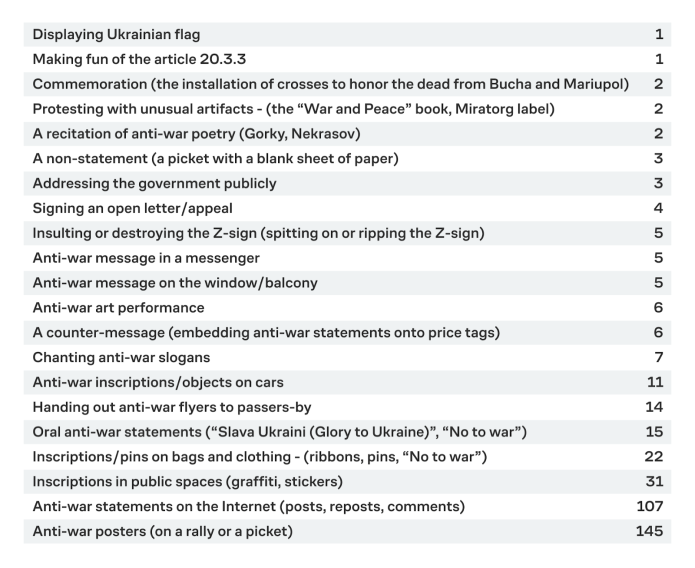
For example, under Article 20.3.3 of the Code of Administrative Offenses, a report can be drawn up if a person goes out on the street with a Ukrainian flag or hangs it from his window. Any items with an anti-war theme — badges, stickers, ribbons — also become «discrediting».
You can get a report if you wear them on clothes or attach them to a car. The armed forces are also «discredited» by reading anti-war poems and even going out into the street with Leo Tolstoy’s book «War and Peace». Finally, according to law enforcement officers, article 20.3.3 also includes several statements that, at first glance, have nothing to do with the war.
In March, two young people in different cities — Ivanovo and Moscow — went out on single-person pickets with the same posters. There was an inscription «*** *****» on both posters. Both picketers were detained. A picketer from Moscow, Dmitry Reznikov, has already been fined 50,000 rubles.
According to him, the decision to go out with such a poster was impulsive, and the main thing was not the message but the act of the picket itself. «As you can see, anything could be written, ” Dmitry says in a conversation with OVD-Info. «That just happened to be the stars.»
The police officers who detained the picketer decided that the phrase «NO TO WAR» was encrypted on the poster; they even talked to the detainee. «[The policeman] told me that I don’t understand anything, I didn’t fight and I wasn’t in the army. While talking to me, he used the word ‘war’, ” Dmitry recalls.
The second picketer from Ivanovo, Mikhail Gusev, filed a lawsuit alleging that the detention for a poster with «stars» was illegal. The police explained in court that the poster had «five-pointed stars of the Soviet army, and this ideogram, which is widespread throughout the world, is associated with military topics for most citizens.» Law enforcement officers did not care that, actually, the symbols depicted on the poster were six-pointed stars.
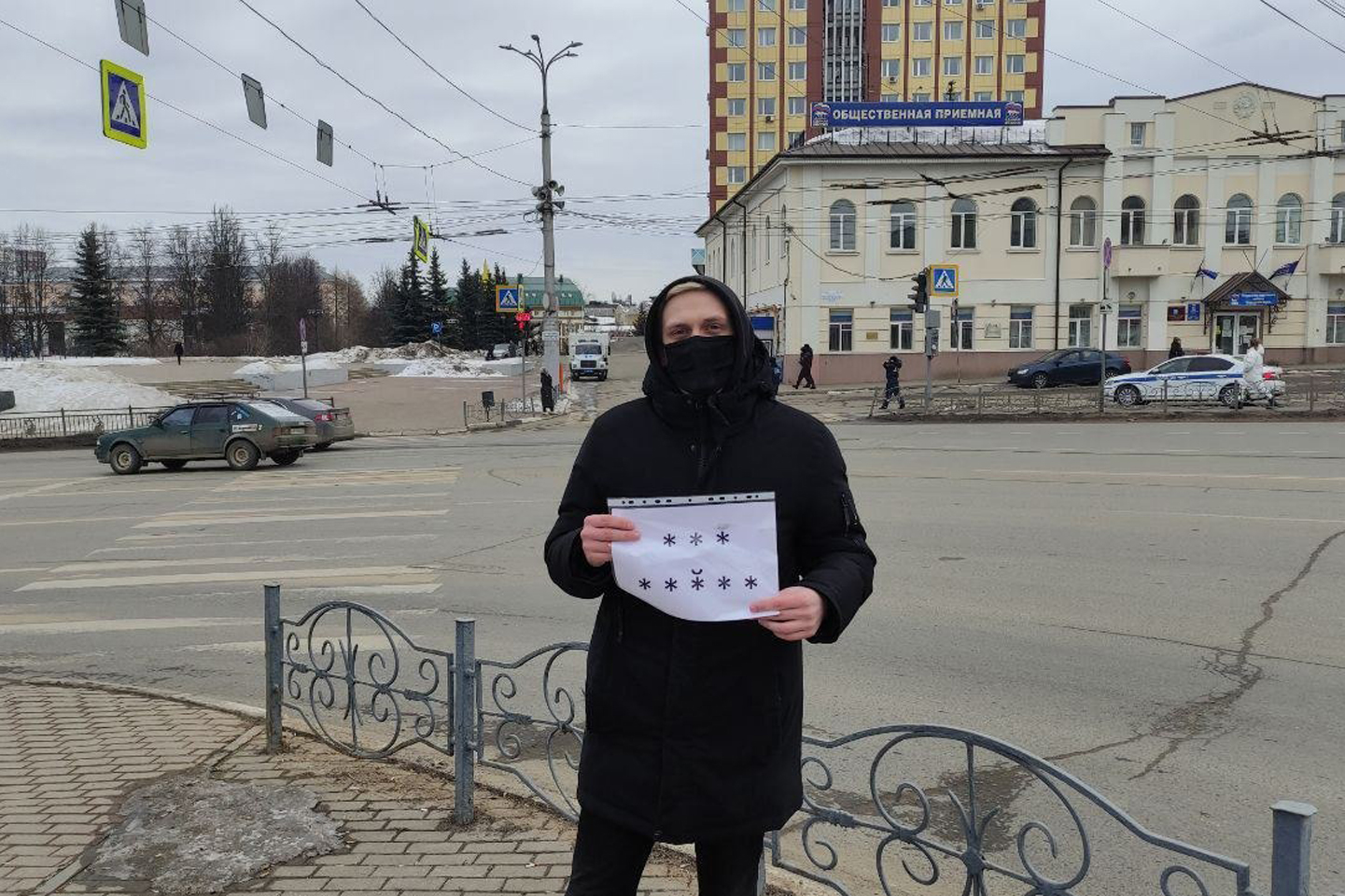
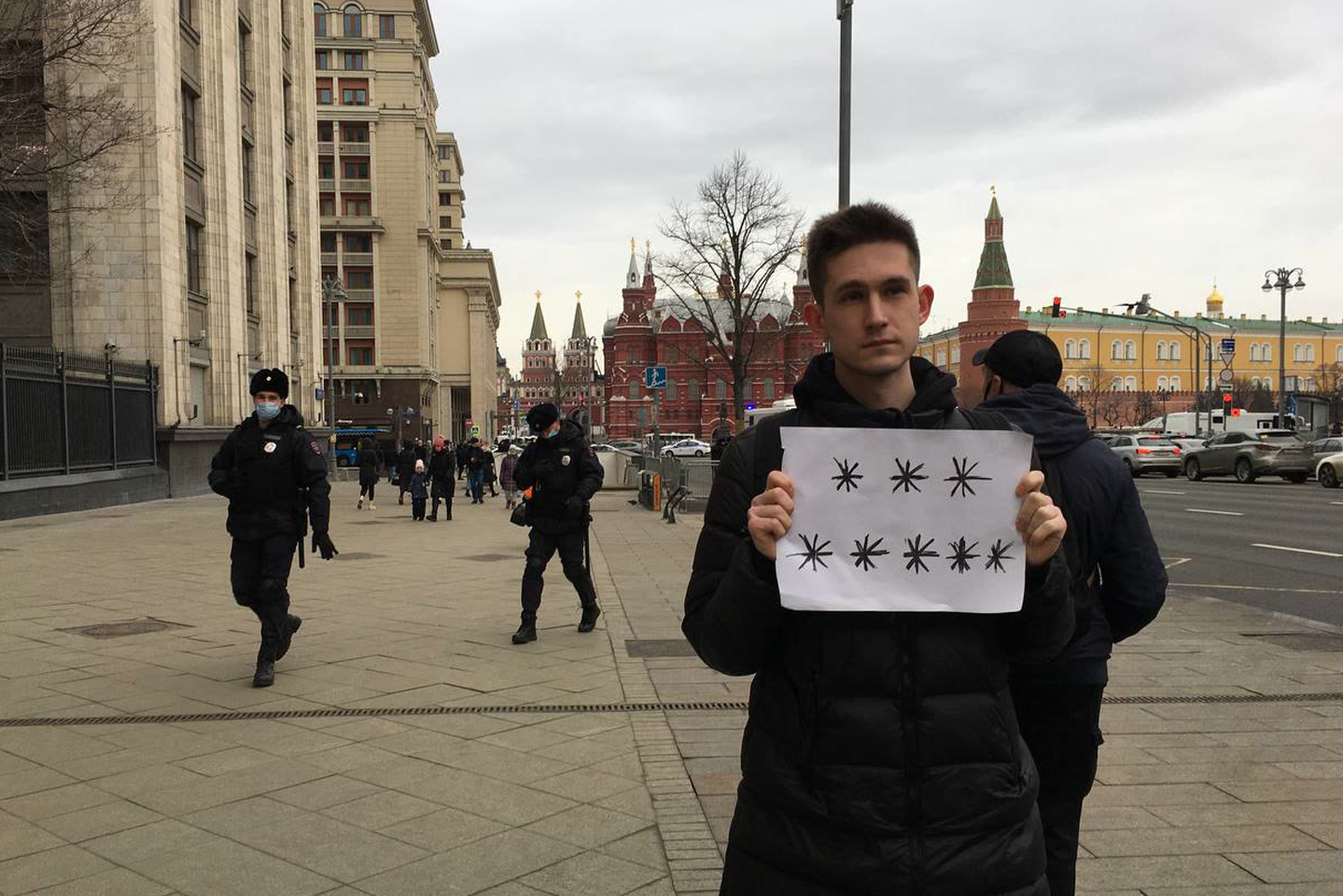
Alexandra Arkhipova considers such inscriptions and posters to be statements of an «Aesopian» language. Aesopian language can be called an allegory: for example, in literature, it can be expressed by deliberately masking the author’s thought, which, however, can be unraveled.
According to the anthropologist, one of the reasons why anti-war statements are encrypted is their ability to circumvent censorship in some cases:
«Roughly speaking, janitors or social services are instructed to „clean up“ the inscriptions „NO WAR“ on the walls, and they clean it up. But they are more likely to miss the posters of the „Vesna (Spring)“ movement with large letters „The dog is missing“ and the text with a call to go to the rally further below. Some of these posters have been hanging for at least a month.»
Not only do such statements serve as «guerilla practices, ” Arkhipova says, but they are also perceived in a completely different way than the phrase «NO WAR.»
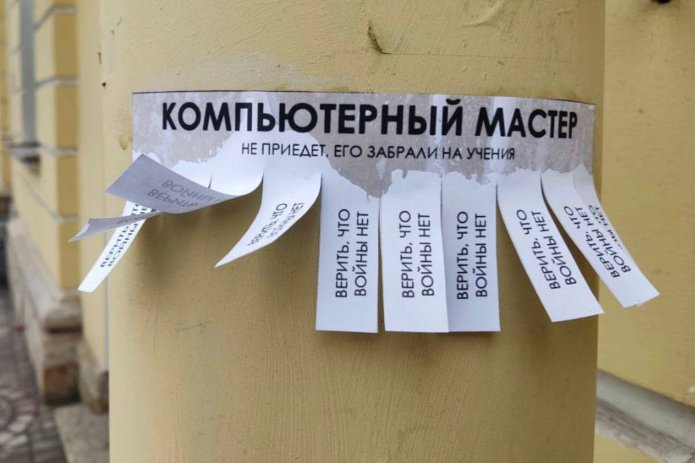
«Let’s say [our brain] sees an image of four girls from the swan ballet and starts thinking: I read this inscription as a reference to the ballet, but what does the ballet have to do with it? The brain scans this image a second time and understands that, in fact, this is not just a reference to the ballet, but a hint of the desired death of the leader or the desire for political change», explains Arkhipova. «Let’s remember the meaning of «Swan Lake»: both in late Soviet times and during the State Emergency Committee when, during the coup, the ballet was constantly broadcasted on TV. Thus, such posters and statements attract attention with their double meaning and the presence of a wordplay.
According to the anthropologist, the presence of double meaning, wordplay and discrepancy not only makes us read this message twice but also helps to memorize it better because it has to be interpreted more than once.
«Because we have interpreted [such an inscription], we feel some pleasure and, therefore, are more likely to spread it, ” Arkhipova said. «Imagine some Maria Ivanovna walking along the street in St. Petersburg. Maria Ivanovna has an anti-war position. She sees the slogan «NO WAR» and is glad that someone wrote it. Then, she goes further along the street and sees, for example, a graffiti on which three ballerinas are drawn, then a space is added, and five more ballerinas are depicted. Maria Ivanovna freezes in bewilderment. The brain first reads it as «Swan Lake», then it understands that three and five also mean something, realizes that it, in fact, says, «NO WAR», and thinks: «Oh, cool!» A burst of endorphin, and Maria Ivanovna remembers the graffiti. Most likely, she will take out her phone and take a picture of it. And so the second life of this graffiti begins — the statement ends up in social networks and begins to circulate.
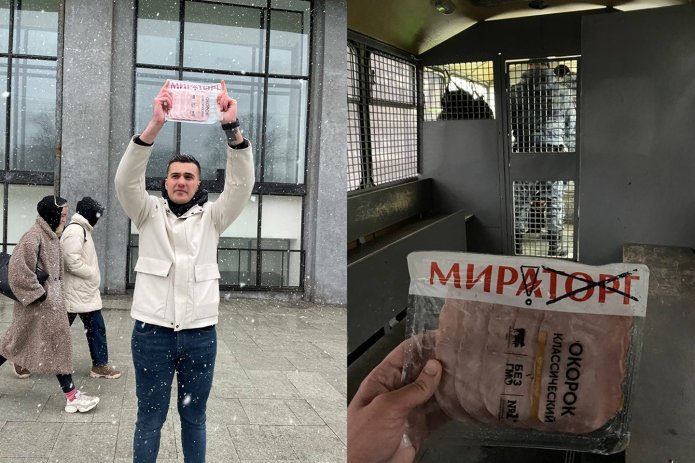
Indeed, metaphorical examples of such statements are becoming popular on the Internet. During the conversations for this text with OVD-Info, the detainees and the experts all recalled the well-known cases of pickets with a MIR bank card and a Miratorg sausage package (the letters «Atorg» were crossed out).
With varying degrees of success (as a result, reports were drawn up for some people, and some of them were released without them), the police wanted to charge «discrediting» for other «strange» symbols and statements:
- for the poster «Fascism will not pass» (a fine of 50 thousand rubles)
- for a blank sheet of paper (as a result, a report was drawn up under the rally article 20.2 of the Code of Administrative Offense)
- for a blue and yellow hat (a fine of 30 thousand rubles)
- for the avatar on Twitter (no trial yet)
- for the poster «Sixth commandment — Thou shalt not kill» (released)
- for a patch with a crossed-out portrait of Putin (no trial yet)
Also, the «discrediting» of the Russian army is charged simply for participating in anti-war rallies. A resident of Tomsk, who was detained on March 6 for protests against the war with Ukraine, received a fine of 30 thousand rubles «for silent support of the anti-war protests» — in fact, for participating in the anti-war protest.
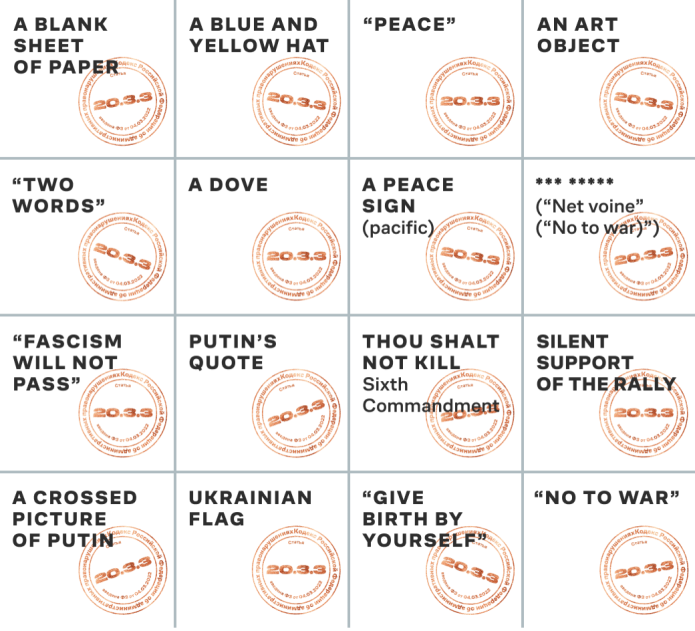
According to OVD-Info lawyer Dmitry Piskunov, drawing up reports under the article on «discrediting» in such cases is an abuse of authority by police officers.
«Any non-obvious statement that requires interpretation, even «NO WAR, ” especially stars or sausage packaging, must go through an expert evaluation, ” Piskunov explains. «These experts can be linguists, cultural scientists, depending on the context, and even anthropologists or art historians. Whether or not such statements indeed 'discredit' the armed forces should be decided by an expert.»
Even though the examination would certainly find these statements «discrediting», the lawyer believes that the police would not be able to collect hundreds of such administrative cases and quickly take them to court. «It would drag on for months. One expert examines for a week, and if he had a queue of dozens of «administrative offences», [law enforcement officers] would never be able to submit so many case materials to the court on time (meaning the period during which one can be held accountable under these articles: if the materials are not submitted to the court during this time, the case is to be terminated — OVD-Info), ” says Piskunov.
In addition, it would be possible to conduct independent examinations initiated by the defense, which would also delay the consideration of the case. «And now all these examinations are ‘carried out’ by the police themselves, right in the report on an administrative offense, ” the lawyer adds.
According to Piskunov, in such cases, the police seriously abuse their authority — in Russian law, they have the authority only to find signs of an offense, and experts and courts decide whether it took place or not.
«It’s like a policeman finds a bag with a strange substance and says right away: ‘I’m sure it’s drugs, no examination is needed’. It’s the same here’, explains the lawyer. «They saw some statement on your bag, and the policeman says: ‘Here is the ‘discrediting’ of the armed forces’.»
Another OVD-Info legal analyst, Alex Lokhmutov, believes that the administrative article assumes responsibility for «discrediting» both the Russian army and the war itself. «The practice is quite wide and even predictable, assuming that the article is applied exactly as it was conceived: to suppress any disagreement with the actions of the authorities, with the cult of war».
Lokhmutov believes that the law cannot be of high quality: after all, it provides unlimited freedom of its application. «If people are punished for ‘silent support’, ‘peace’, ‘mentioning the war’, participating in protests, blank sheets and the fact that there are ‘similar’ calls on the Internet, this is not the law. It is a creation of some legal arbitrariness, the bureaucratic manifestation of repression, ” adds Lokhmutov.
According to OVD-Info lawyer Dmitry Piskunov, it is strange that the courts are satisfied with such an application of the article — without conducting any expert examinations. «In fact, we have martial law in our country now, but it was not officially introduced, ” the lawyer believes. «Courts under martial law take on faith the decisions of the police [about what is ‘discrediting’ and what is not].»

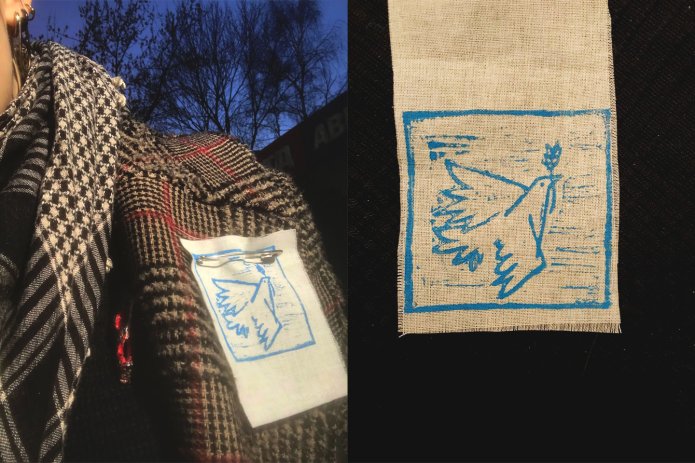
Lokhmutov believes that the appearance of Article 20.3.3 and its application violates the European Convention on Human Rights and the International Covenant on Civil and Political Rights. The administrative article restricts freedom of expression and implies punishment based not on the law but legal arbitrariness, Lokhmutov believes. «But in general, all these international documents are based on the ideals of the world, ” the lawyer notes. Universal Declaration of Human Rights and the European Convention reaffirm the commitment to the freedoms that are the basis of world peace. And the [International] Pact forbids war propaganda altogether.»



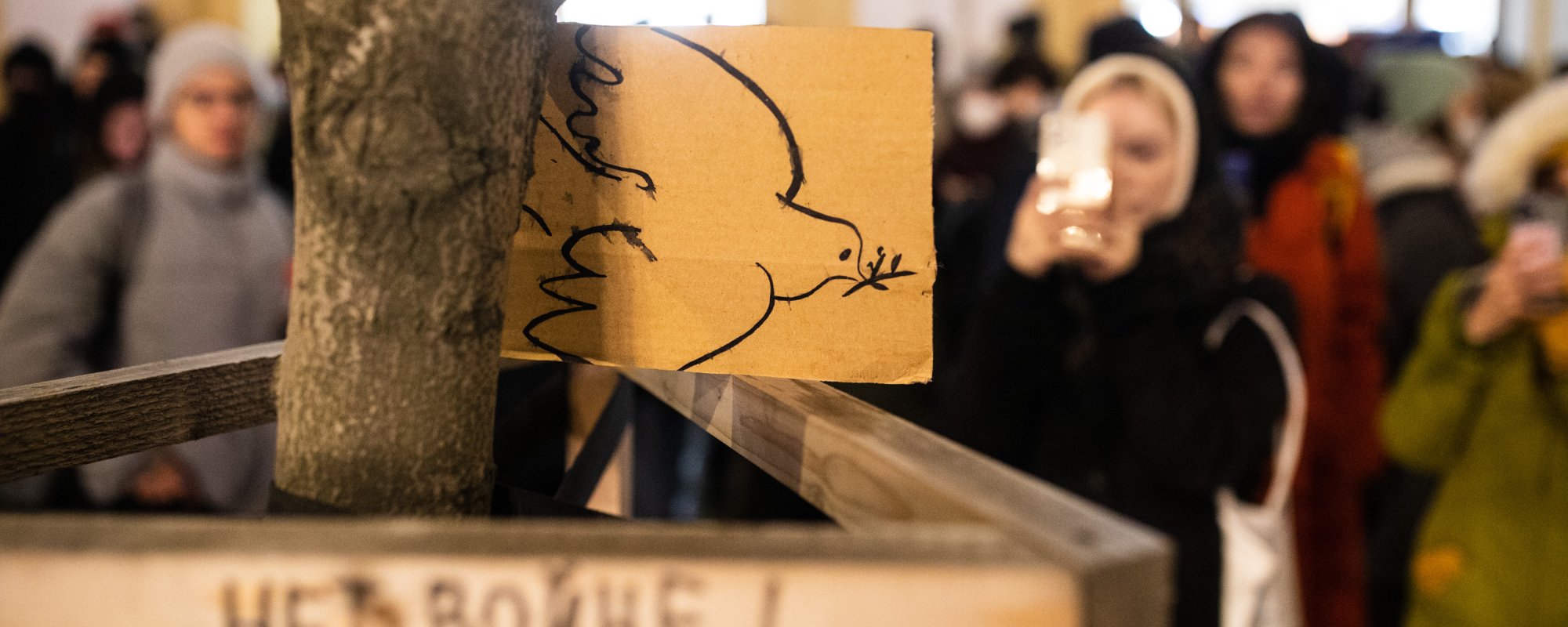
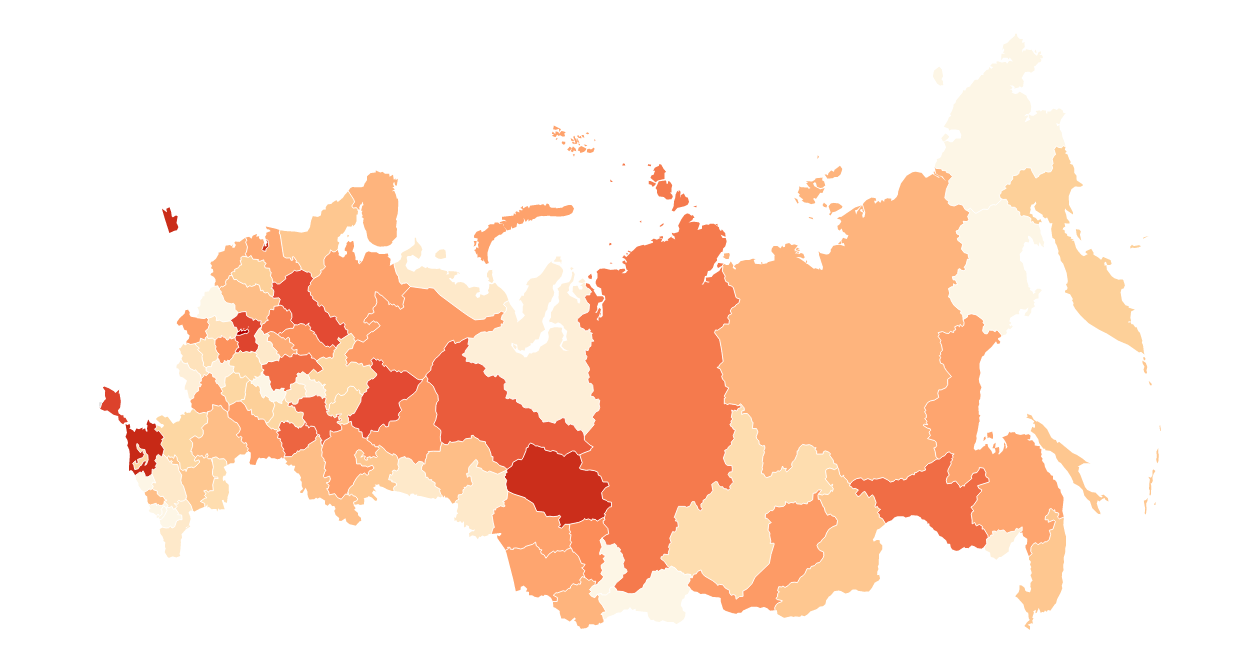
 Download.pdf
Download.pdf